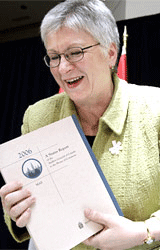
GAO Gives
Government Credibility

GAO Gives
Government Credibility
The
Perspective
Atlanta, Georgia
January 26, 2007
 |
|
John Morlu, II
Auditor General of Liberia |
The GAO must be seen
as the only institution that will justify government’s claims that, this
time—unlike previous times—it is truly working to bring about the desired
social change and lift the country out of poverty and decadence. Fiscal
indiscipline germinates underdevelopment and social unrest. It drives away
people’s zeal and commitment, and creates a nation of faked patriots and
lip-servants.
Other nations—be they
developed or underdeveloped—are developing a new mindset that pits them against
corruption and misappropriation of public funds. They now resolve that the
public property is sacred and cannot be taken for granted. Fraud, waste and
abuse must be tackled on all fronts!
That landmark audit
report was politicized as it was scrutinized by politicians. But the audit
withstood the test of time. It was meticulous, professional and honest. Such
achievement by any auditing entity requires the support and commitment of the
government totally interested in financial probity, advancing the cause of its
people and eradicating corruption.
Successful nations
always see the bigger picture; they put their countries first and foremost.
They bask in public service to leave a lasting, impressive legacy. This is why
their accountability mechanisms are sound-proof, supported and independent,
which in turn germinate respect, honor and trust for their countries and
governments.
The Office of Auditor
General of Liberia is pleased to bring you a reflection of the Office of the
Auditor General of Canada headed by Sheila Fraser on a landmark audit conducted
in 2002 as published by INTOSAI, the International Organization of Supreme
Audit Institution, a United Nations sponsored organization for all auditing
institutions in the world. “AG Frasher talks, the world listened,” lamented a
Canadian Profession of Accountancy. But like any individual heading a
front-line institution to defend and promote the public interest, her
institution was questioned and tested, but with share honesty, dedication and
competent work, she and her team were able to weather the storm against public
scrutiny.
We want Liberians to
read this reflection and think about the valuable lessons contained therein,
and how we can benefit from such experience and exercise, as we embark on a new
course to build an accountable governing system that will withstand the test of
time.
Public Scrutinizes
By Sheila
Fraser,
 |
|
Sheila Fraser
Auditor-General of Canada |
Background
In March 2002, the then
Minister of Public Works and Government Services asked the OAG to audit three
contracts totaling 1.6 million Canadian dollars (1.1 million euros) that had
been awarded to a communications agency in the late 1990s for advertising
services designed to increase the visibility of the government of Canada. That
audit report, presented to Parliament in May 2002, revealed significant
shortcomings at all stages of the contract management process. Because of the
nature of the findings, we referred the government’s handling of the three
contracts to the Royal Canadian Mounted
Police (RCMP), our national police service. We also decided that we would
undertake a governmentwide audit of the sponsorship program and advertising
activities of the government of
Sponsorships were intended to
increase the visibility of the federal government in the
Audit Findings on the Sponsorship Program
Our audit found that Parliament had
not been informed of the program’s objectives or the results it achieved and
was misinformed as to how the program was being managed. Those responsible for
managing the program broke the government’s contracting rules in the way they
selected advertising firms and awarded contracts to them. We found significant
shortcomings at all stages of the contract process: in making the decision to
contract the work, developing the contract specifications, selecting the
contractor, and ensuring that the government received the contracted goods or
services before paying the contractor.
There was a lack of transparency in
decision making. No written program guidelines provided clear criteria for
eligibility, and no written objectives indicated that the program had been part
of a national unity strategy. Moreover, a lack of documentation prevented us
from determining why an event was selected for sponsorship, how the dollar
value of a sponsorship was determined, or what federal visibility the
sponsorship would achieve. Furthermore, there was little oversight of financial
activities, and fundamental principles of control were violated. Roles and
responsibilities were not segregated to eliminate opportunities for fraud or an
override of controls by management. There was little evidence of analysis to
support the expenditure of more than 250 million Canadian dollars (173 million
euros) from 1997 to March 2003. Over 100 million Canadian dollars (69 million
euros) of that was paid to communications agencies as production fees and
commissions.
In some cases, sponsorship funds
were transferred to Crown corporations using highly questionable methods that
appeared to have been designed to provide significant commissions
to communications agencies while
hiding the source of funds and the true nature of the transactions. Some
payments were based on false invoices and contracts. Appearing before the
Standing Committee on Public Accounts, I informed parliamentarians of the
appalling lack of regard for rules and regulations that we saw in the way
contracts were managed. Equally disturbing was that it happened in the very
department, Public Works and Government Services, that is supposed to ensure
prudence, probity, and fairness in contract management throughout the
government. The problem was not a lack of rules but the failure to observe
existing rules.
Our audit revealed that the
government had run the sponsorship program in a way that showed little regard
for Parliament and its financial administration legislation. Controls and
oversight mechanisms that should have been in place had collapsed. Moreover,
politicians and senior bureaucrats were reluctant to recognize their
responsibilities and to be accountable for their actions.
The Gomery Commission
Our governmentwide audit report on
the sponsorship, advertising, and public opinion research activities of the Canadian
government was tabled in the House of Commons on February 10, 2004. A few days
later, the government announced the creation of a Commission of Inquiry into
sponsorship and advertising activities. It also hired a special counsel to
recover funds that might have been improperly received through the sponsorship
program. The government cancelled the sponsorship program in December 2003,
several months before we tabled our audit in the Canadian legislature.
The public inquiry, headed by
Justice John A. Gomery, a judge of the Superior Court of Quebec, had a double
mandate: (1) to investigate and report on questions raised in our report and to
make recommendations to the government of
But our meticulous adherence to
methodology and professional standards stood us in very good stead throughout
the events. And the Gomery inquiry concluded its hearings without any serious
challenge to the credibility of our report. Justice Gomery commended our work
in his final report: “It became apparent to me throughout the hearings that,
with virtually no exceptions, the conclusions of the Auditor General of
Lessons Learned
Given that an audit had never been
the subject of a public inquiry in
We have also taken steps to further
strengthen our audit evidence to ensure that it can withstand a vigorous
challenge. For example, we have decided that interview notes should be signed
by interviewees when the contents are evidentiary in nature. As soon as our
report was tabled, the public discussion about it became extremely political as
the government and opposition parties engaged in a political tug of war about
who was responsible. When we saw how the public debate was evolving, we stopped
giving media interviews. Despite this decision, we continued to be mentioned in
news stories about the “sponsorship scandal,” as it was called by the media,
for many months. The parliamentary Public Accounts Committee later commended
our work, noting the following:
Efforts were made by some witnesses
to discredit or refute certain elements of the Auditor General’s report [on the
sponsorship program]. These efforts were generally self-serving and wholly
unconvincing. From past experience, the
[Public Accounts] Committee is quite
familiar with the audit methodology employed by the
Office of the Auditor General and the vetting process the Office [SAI Canada]
follows to confirm the findings that methodology produces. This process is
painstaking and thorough.
The overwhelming weight
of the evidence presented to the [Public Accounts] Committee has consistently
confirmed and strengthened the observation and conclusions made by the Auditor
General in her report [on the sponsorship program].
That our report
withstood intense public scrutiny reflects well on the rigor of our audit work
and the professionalism of the men and women who work at the Office of the
Auditor General of
Finally, it was
rewarding for me, as head of our supreme audit institution, to ascertain
firsthand that Canadians and parliamentarians continue to hold our office in
high regard and have great confidence in the quality of our audit work.
The Auditor General of
Culled from International Journal of Government Auditing–January
2007, WWW.INTOSAIJOURNAL.ORG
Source: Sponsored by the General Auditing Office (GAO),